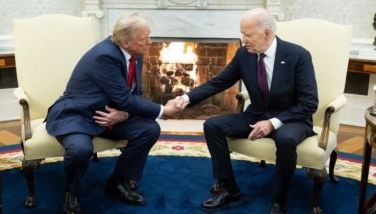Bulgarian students demand end to govt corruption
SOFIA — Ivaylo Dinev believes the time has come to change his world. To do so, he's chosen a tactic straight from the 1960s — the sit-in.
The 24-year-old anthropology student is the informal leader of a group that has occupied Sofia University's main building since the end of October in hopes of forcing Bulgaria's Socialist-led government to resign.
"We want morality in politics, we want our politicians to work for the people and not for the Mafia," Dinev said. "That is the main reason we want the government to resign."
Bulgaria has struggled for decades against corruption. In the 28-nation EU, it lags only behind Greece on Transparency International's corruption perception index. In the country's courts, magistrates have accepted bribes to end some corruption investigations and not a single high-profile person has been sent to jail.
The century-old occupied building is in the very center of Sofia, the capital, just 200 meters (yards) from Parliament. Behind entrances locked with iron chains and makeshift security checkpoints, a few hundred young men and women have barricaded themselves in what they call the "free territory of the students."
Under a huge symbolic sign "1968" — the year that Czech students challenged their country's powerful former Communist regime — a banner reads: "Now it is our time."
"As a growing parallel power, we are sending from our free territory critical messages to all political parties about the future of the country," Dinev told The Associated Press in an interview.
The Sofia University occupation has spawned other university sit-ins, energizing a 5-month-old movement against the government over allegations that its leaders have ties to shady businessmen. Public opinion polls show about two-thirds of Bulgaria's 7.3 million people support the protesters, including several hundred university professors.
Bulgaria is a member of the 28-nation European Union but its people have the bloc's lowest incomes — an average monthly wage of just 400 euros ($537) and an average pension of just 150 euros ($202). Youth unemployment is at 28.7 percent. Growing economic pains and widespread poverty have created deep divisions in society.
The 50 students who first occupied Sofia University say they will stay until the government steps down, Dinev said, adding that their numbers have swelled to 500.
The mood inside the century-old building was upbeat. Slogans reading "Resignation" and "Mafia" were up on inner courtyard walls. Sleeping bags were draped on benches in the corridors as makeshift beds.
Some students carried bags of food partly donated by supporters, while in a coffee shop, small groups were debating the future they want to build. No classes are being taught in the building — home to the law, philosophy and language departments — but at a daily conference in the main hall, students meet to outline future actions.
As his phone rings, Dinev says the students have rejected several invitations to collaborate with Bulgaria's established political parties.
On Tuesday, police clashed with protesting students who tried to make a human chain around Parliament in an attempt to blockade lawmakers inside.
"We cannot just stand and watch these atrocities that are happening in the country, we cannot sit at home and wait for new elections and we cannot vote for someone else's nominees and to feel forced to leave the country because there are no normal living conditions," said Alexander Popov, 25, one of the students injured in clashes.
The Socialist-backed government took office after an early election in May, following the resignation of the previous cabinet amid anti-austerity protests. But it was the June 14 appointment of media mogul Delyan Peevski as head of the national security agency that sparked public anger and new street protests. The appointment was immediately revoked but to demonstrators it was a clear sign of the corruption and nepotism practiced by group of businessmen and politicians they believe run the country behind the government.
"If there has to be a power above the government, then this should not be some behind-the-curtain player but rather the citizens themselves," said Dinev.
Prime Minister Plamen Oresharski has so far rejected calls to resign and has criticized the students for blocking access to education. But his governing coalition is weak, made up of Socialists and an ethnic Turkish party with only 120 seats in the 240-seat Parliament. Last week, authorities launched investigations into alleged tax fraud and money laundering by Hristo Biserov, the deputy leader of the Turkish party.
Most analysts believe the only way to ease tensions is to set a date for early elections, possibly in May, when Bulgarians will also vote for European Parliament seats.
Dinev believes it is up to the "kids of transition," as he dubbed his generation, to bring morality to politics. More than a million mostly young, well-educated Bulgarians have left since the 1989 fall of communism, but that's not the goal of these protesters.
"You can emigrate, we will stay here," read one slogan at the protest before Parliament.
- Latest
- Trending




























